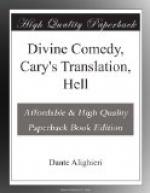Then I to him: “If from our world this
sluice
Be thus deriv’d; wherefore to us but now
Appears it at this edge?” He straight replied:
“The place, thou know’st, is round; and
though great part
Thou have already pass’d, still to the left
Descending to the nethermost, not yet
Hast thou the circuit made of the whole orb.
Wherefore if aught of new to us appear,
It needs not bring up wonder in thy looks.”
Then I again inquir’d: “Where flow
the streams
Of Phlegethon and Lethe? for of one
Thou tell’st not, and the other of that shower,
Thou say’st, is form’d.” He
answer thus return’d:
“Doubtless thy questions all well pleas’d
I hear.
Yet the red seething wave might have resolv’d
One thou proposest. Lethe thou shalt see,
But not within this hollow, in the place,
Whither to lave themselves the spirits go,
Whose blame hath been by penitence remov’d.”
He added: “Time is now we quit the wood.
Look thou my steps pursue: the margins give
Safe passage, unimpeded by the flames;
For over them all vapour is extinct.”
CANTO XV
One of the solid margins bears us now
Envelop’d in the mist, that from the stream
Arising, hovers o’er, and saves from fire
Both piers and water. As the Flemings rear
Their mound, ’twixt Ghent and Bruges, to chase
back
The ocean, fearing his tumultuous tide
That drives toward them, or the Paduans theirs
Along the Brenta, to defend their towns
And castles, ere the genial warmth be felt
On Chiarentana’s top; such were the mounds,
So fram’d, though not in height or bulk to these
Made equal, by the master, whosoe’er
He was, that rais’d them here. We from
the wood
Were not so far remov’d, that turning round
I might not have discern’d it, when we met
A troop of spirits, who came beside the pier.
They each one ey’d us, as at eventide
One eyes another under a new moon,
And toward us sharpen’d their sight as keen,
As an old tailor at his needle’s eye.
Thus narrowly explor’d by all the tribe,
I was agniz’d of one, who by the skirt
Caught me, and cried, “What wonder have we here!”
And I, when he to me outstretch’d his arm,
Intently fix’d my ken on his parch’d looks,
That although smirch’d with fire, they hinder’d
not
But I remember’d him; and towards his face
My hand inclining, answer’d: “Sir!
Brunetto!
“And art thou here?” He thus to me:
“My son!
Oh let it not displease thee, if Brunetto
Latini but a little space with thee
Turn back, and leave his fellows to proceed.”
I thus to him replied: “Much as I can,
I thereto pray thee; and if thou be willing,
That I here seat me with thee, I consent;
His leave, with whom I journey, first obtain’d.”
“O son!” said he, “whoever of this
throng
One instant stops, lies then a hundred years,
No fan to ventilate him, when the fire
Smites sorest. Pass thou therefore on.
I close
Will at thy garments walk, and then rejoin
My troop, who go mourning their endless doom.”




